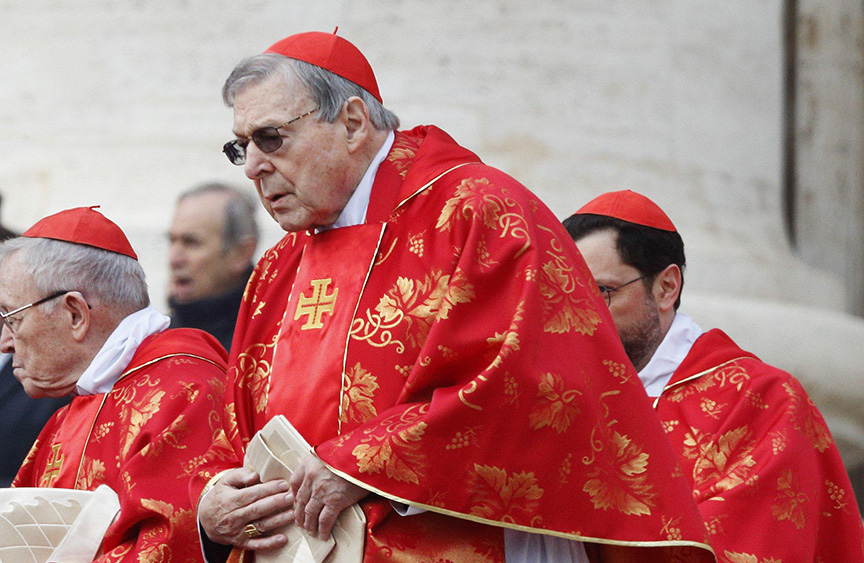
VATICAN CITY. Pope Francis praised the late Australian Cardinal George Pell as a faithful servant of God and of the Catholic Church, who steadfastly followed the Lord even “in the hour of trial” when he was jailed for sexual abuse before his conviction was overturned by Australia’s highest court.
Cardinal Pell died in Rome Jan. 10 at the age of 81 after suffering a heart attack following hip replacement surgery.
Cardinal Giovanni Battista Re, dean of the College of Cardinals, was scheduled to preside over the cardinal’s funeral Jan. 14 in St. Peter’s Basilica with Pope Francis presiding over the final commendation and farewell at the end of the Mass. Cardinal Pell reportedly will be buried in St. Mary’s Cathedral in Sydney, but further details were not available immediately.
In an interview with Italy’s Mediaset broadcast Dec. 18, Pope Francis was asked what part of his job he would have preferred not having had to deal with, and he responded, the Vatican’s financial chaos and scandals.
The need for a thorough clean up “was clearly seen by Cardinal Pell, who is the one who started” making progress, the pope said, but then he was required to return to Australia “because of this calumny” of being accused of sexual abuse.
“He was innocent,” Pope Francis said in the December interview. “He is a great man, and we owe him so much.”
The pope made the same points in a telegram addressed Jan. 11 to Cardinal Re.
Offering his condolences also to Cardinal Pell’s brother and family members, Pope Francis said the Australian prelate would be remembered for “his consistent and committed witness, his dedication to the Gospel and the Church, and particularly his diligent cooperation with the Holy See in its recent economic reform, for which he laid the foundations with determination and wisdom.”
He prayed that the cardinal, “who without wavering followed his Lord with perseverance even in the hour of trial,” would be “received into the joy of heaven and receive the reward of eternal peace.”
Australian Archbishop Timothy Costelloe of Perth, president of the Australian Catholic Bishops’ Conference, said, “Cardinal Pell’s impact on the life of the Church in Australia and around the world will continue to be felt for many years. As we remember him and reflect on his legacy, I invite all Catholics and other people of goodwill to join in praying for Cardinal Pell, a man of deep and abiding faith, and for the repose of his soul.”
Australian Archbishop Mark Coleridge of Brisbane, former president of the conference, said Cardinal Pell “didn’t claim to be a saint; he knew he was flawed. But he did claim – and rightly – to be a man of faith and a man of the Church.”
Cardinal Pell “became the victim of an outrageous injustice as he was convicted and jailed for 13 months before a final vindication,” Archbishop Coleridge said, referring to the cardinal’s conviction in late 2018 on five counts of sexual abuse. The cardinal had served more than 400 days of a six-year sentence when the judges of the High Court of Australia overturned the conviction, concluding there was “a significant possibility that an innocent person has been convicted because the evidence did not establish guilt to the requisite standard of proof.”
“The spiritual poise and strength he showed through all of this was extraordinary,” Archbishop Coleridge said. “It revealed a depth to George Pell that often went unrecognized.”
“Through his legal troubles,” the archbishop said, “he was identified wholly with the Catholic Church and vice versa. Pell was the Church, and the Church was Pell – big, powerful and heartless in the eyes of many.”
“Yet,” he continued, “if George Pell had anything they were a good heart and a sense of humor. It was a pity that more of this didn’t show in his media appearances.”
Born June 8, 1941, in Ballarat, Australia, he was a star Australian rules football player in high school and college, but left that behind to enter the seminary, studying first in Australia and then at the Pontifical Urban University in Rome. He was ordained to the priesthood in 1966 at St. Peter’s Basilica in the Vatican.
St. John Paul II appointed him an auxiliary bishop of Melbourne in 1987, archbishop of Melbourne in 1996, archbishop of Sydney in 2001, and gave him the cardinal’s red hat in 2003.
Soon after his election, Pope Francis named Cardinal Pell to his international Council of Cardinals to advise him on the reform of the Roman Curia and, in 2014, Pope Francis named him prefect of the new Council for the Economy.
Cardinal Pell’s death leaves the College of Cardinals with 223 members, 125 of whom are under the age of 80 and eligible to vote in a conclave.









